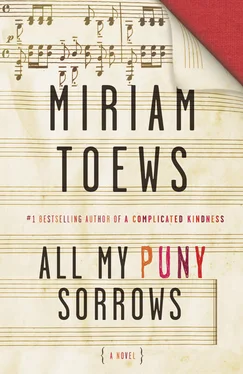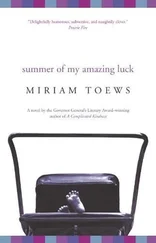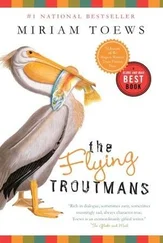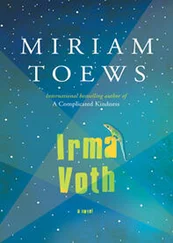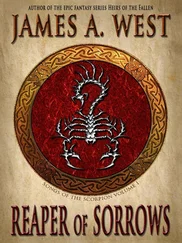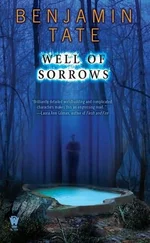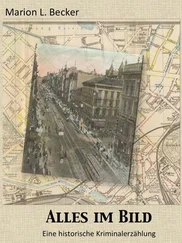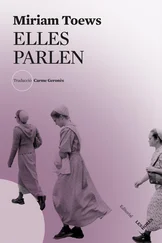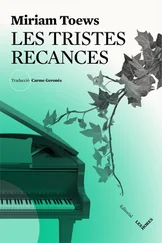Miriam Toews
All My Puny Sorrows
OUR HOUSE WAS TAKEN AWAY on the back of a truck one afternoon late in the summer of 1979. My parents and my older sister and I stood in the middle of the street and watched it disappear, a low-slung bungalow made of wood and brick and plaster slowly making its way down First Street, past the A&W and the Deluxe Bowling Lanes and out onto the number twelve highway, where we eventually lost sight of it. I can still see it, said my sister Elfrieda repeatedly, until finally she couldn’t. I can still see it. I can still see it. I can still … Okay, nope, it’s gone, she said.
My father had built it himself back when he had a new bride, both of them barely twenty years old, and a dream. My mother told Elfrieda and me that she and my father were so young and so exploding with energy that on hot evenings, just as soon as my father had finished teaching school for the day and my mother had finished the baking and everything else, they’d go running through the sprinkler in their new front yard, whooping and leaping, completely oblivious to the stares and consternation of their older neighbours, who thought it unbecoming of a newly married Mennonite couple to be cavorting, half dressed, in full view of the entire town. Years later, Elfrieda would describe the scene as my parents’ La Dolce Vita moment, and the sprinkler as their Trevi Fountain.
Where’s it going? I asked my father. We stood in the centre of the road. The house was gone. My father made a visor with his hand to block the sun’s glare. I don’t know, he said. He didn’t want to know. Elfrieda and my mother and I got into our car and waited for my father to join us. He stood looking at emptiness for what seemed like an eternity to me. Elfrieda complained that the backs of her legs were burning up on the hot plastic seat. Finally my mother reached over and honked the horn, only slightly, not enough to startle my father, but to make him turn and look at us.
It was such a hot summer and we had a few days to kill before we could move into our new house, which was similar to our old house but not one that my father had built himself with loving attention to every detail such as a long covered porch to sit in and watch electrical storms while remaining dry, and so my parents decided we should go camping in the Badlands of South Dakota.
We spent the whole time, it seemed, setting everything up and then tearing it all down. My sister, Elfrieda, said it wasn’t really life — it was like being in a mental hospital where everyone walked around with the sole purpose of surviving and conserving energy, it was like being in a refugee camp, it was a halfway house for recovering neurotics, it was this and that, she didn’t like camping — and our mother said well, honey, it’s meant to alter our perception of things. Paris would do that too, said Elf, or LSD, and our mother said c’mon, the point is we’re all together, let’s cook our wieners.
The propane stove had an oil leak and exploded into four-foot flames and charred the picnic table but while that was happening Elfrieda danced around the fire singing “Seasons in the Sun” by Terry Jacks, a song about a black sheep saying goodbye to everyone because he’s dying, and our father swore for the first recorded time (What in the Sam Hills!) and stood close to the fire poised to do something but what, what, and our mother stood there shaking, laughing, unable to speak. I yelled at my family to move away from the fire, but nobody moved an inch as if they had been placed in their positions by a movie director and the fire was only fake and the scene would be ruined if they moved. Then I grabbed the half-empty Rainbow ice cream pail that was sitting on the picnic table and ran across the field to a communal tap and filled the pail with water and ran back and threw the water onto the flames, which leapt higher then, mingled with the scents of vanilla, chocolate and strawberry, towards the branches of an overhanging poplar tree. A branch sparked into fire but only briefly because by then the skies had darkened and suddenly rain and hail began their own swift assault, and we were finally safe, at least from fire.
That evening after the storm had passed and the faulty propane stove had been tossed into a giant cougar-proof garbage cage, my father and my sister decided to attend a lecture on what was once thought to be the extinct black-footed ferret. It was being held in the amphitheatre of the campground, and they said they might stick around for the second lecture as well, which was being given by an expert in astrophysics about the nature of dark matter. What is that? I asked my sister and she said she didn’t know but she thought it constituted a large part of the universe. You can’t see it, she said, but you can feel its effects, or something. Is it evil? I asked her. She laughed, and I remember perfectly or should I say I have a perfect memory of how she looked standing there in her hot pants and striped halter top with the shadowy eroded Badlands behind her, her head back, way back, her long thin neck and its white leather choker with the blue bead in the centre, her burst of laughter like a volley of warning shots, a challenge to the world to come and get her if it dared. She and my father walked off towards the amphitheatre, my mother calling out to them — make kissing sounds to ward off rattlesnakes! — and while they were gone and learning about invisible forces and extinction, my mother and I stayed beside the tent and played “What Time Is It, Mr. Wolf?” against the last remaining blotches of the setting sun.
On the way home from the campground we were quiet. We had driven for two and a half days in a strange direction that took us away from East Village until finally my father had said well, fair enough, I suppose we ought to return home now, as though he had been trying to work something out and then had simply given up. We sat in the car looking solemnly through open windows at the dark, jagged outcroppings of the great Canadian Shield. Unforgiving, said my father, almost imperceptibly, and when my mother asked him what he had said he pointed at the rock and she nodded, Ah, but without conviction as though she had hoped he’d meant something else, something they could defy, the two of them. What are you thinking about? I whispered to Elf. The wind whipped our hair into a frenzy, hers black, mine yellow. We were in the back seat stretched out lengthwise, our legs entangled, our backs against the doors. Elf was reading Difficult Loves by Italo Calvino. If you weren’t reading right now what would you be thinking about? I asked again. A revolution, she said. I asked her what she meant and she said I’d see someday, she couldn’t tell me now. A secret revolution? I asked her. Then she said in a loud voice so we could all hear her, let’s not go back. Nobody responded. The wind blew. Nothing changed.
My father wanted to stop to see ancient Aboriginal ochre paintings on the rock escarpments that hugged Lake Superior. They had endured mysteriously against the harsh elements of sun and water and time. My father stopped the car and we walked down a narrow, rocky path towards the lake. There was a sign that said Danger! and in small letters explained that people had been known to be swept off these rocks by giant rogue waves and that we were responsible for our own safety. We passed several of these signs on our way to the water and with each dire warning the already deep furrow in my father’s brow became deeper and deeper until my mother told him Jake, relax, you’ll give yourself a stroke.
When we got to the rocky shore we realized that in order to see the “pictographs” one had to inch along slippery, wet granite that plunged several metres into the foamy water and then hang on to a thick rope that was secured with spikes driven into the rock and then lean way back over the lake almost to the point of being horizontal with your hair grazing the water.
Читать дальше
